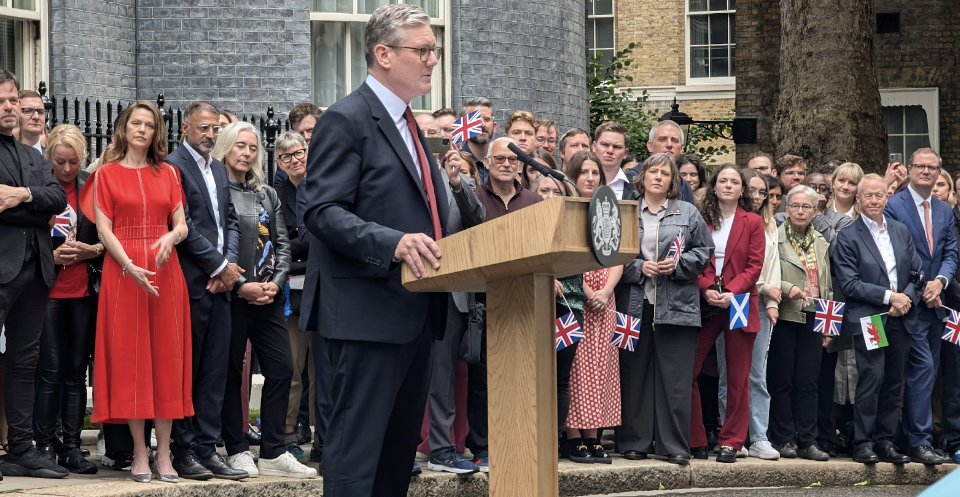Tragedy struck England on July 14th during the Euro Finals held at the Olympiastadion in Berlin; as Spain won a decisive victory against England, and subsequently shattered the hopes and dreams of many English fans who were hoping that football (soccer) was finally “coming home.” Yet, despite having lost two Euro Finals in a row, the entire United Kingdom triumphed last month by finally removing the deeply unpopular Conservative Party (Tories) from power in a general election on July 4th. This year the 4th of July was not only an American celebration of their hard-fought independence– it is also the day when British people rose up against the Tories and emancipated themselves from 14 unbroken years of Tory rule. Labour Party leader, Keir Starmer was quickly sworn in as the new Prime Minister with King Charles’ blessing the next day.
Although the polls have been predicting a Labour landslide for months, the results of the election were nevertheless astounding. The tsunami of discontent against Tory rule culminated in hands-down the worst performance of the Conservative party in its history. The Tories lost 251 seats, and their vote more than halved to 6.8 million, by contrast, Labour ended up winning 411 seats. The 14-year rule of the Tories came to an end, this comes as an understandable shock as rarely has any ruling party in a democratic nation gone from dominion to obscurity in one election. The reasons for this resounding Labour victory are clear: a botched exit from the EU (Brexit), a revolving door of inept leaders, and most importantly: decades of horrific austerity measures that utterly decimated the lives of middle and working-class Brits. As such, people flocked to the polls, desperate for a change in the status quo and on the surface, the people got what they desired all these years, to finally kick out all the Tories sitting in the House of Commons. However, despite the fanfare, Starmer’s Labour government is almost conservative in all but name only; unfortunately, marking, yet, another chapter in the story of 21st century Britain, a tale marked by economic decline, ineffective governments, and neoliberalism.
This plight began on May 11th, 2010 when David Cameron, a soft-spoken Eton-educated establishment Tory politician entered 10 Downing Street and started his tenure as Prime Minister. His government sought to address the fallout of the Great Recession through austerity measures. Cameron and his cabinet persistently waged war on government spending throughout their time in power. In one speech, he stated that he promised to transform Britain from what he perceived as a “low wage, high tax, high welfare society to a high wage, low tax, low welfare” one. Then, Chancellor of the Exchequer, George Osborne, called for cuts of up to 40% in departmental budgets. Cuts were quickly introduced all across the board but Osborne ultimately failed to deliver a budget surplus. What Cameron’s budget cuts did achieve though were job losses and never-before-seen wage stagnation. Public sector staff members were cut substantially. In the NHS, the number of senior staff members was cut by 30 percent, a quarter of staff in prison service lost their jobs, and pupil-to-teacher ratios have risen significantly since 2010. Cameron and Osborne’s cuts came during a period when the UK needed a more Keynesian approach to economics, the country was just recovering from the Great Recession and needed government stimulus in order to boost its economic performance.
The legacy of Cameron and the Conservative Party’s austerity measures can still be felt to this day. In addition, to the gradual decay of crucial public services such as the NHS. According to a report written by students at the London School of Economics and Political Science, austerity cuts have led to a decline in life expectancy and have exacerbated regional health disparities. As such, Fintan O’Toole writes that Britain can be described as a sinking ship. Wage between 2010 to 2020 was the lowest over any ten-year period since the Napoleonic wars, GDP per capita has grown by a flimsy 4.3 percent over the past 16 years, and 4.3 million children are going hungry. According to the House of Commons library, food prices rose by 30.6 percent from May 2021 to May 2024. With collapsing public services and an ever-worsening cost-of-living crisis, it is clear that austerity has gradually fueled widespread discontent against the Tories and it is not surprising that it all erupted on July 4th.
In addition, the long tale of Brexit (the withdrawal from the United Kingdom from the European Union) further exposed the ineffectiveness and incompetency of Tory PMs from Theresa May to Boris Johnson. Austerity created a whole layer of disenfranchised people who were extremely dissatisfied with the status quo. Combined with the economic fallout from 2008, the conditions were ripe for a right-wing populist movement to take hold within British society. The Brexit and its proponents (i.e. Nigel Farage) used the EU as a scapegoat for all of Britain’s economic woes. In addition to immigration, certain layers within British society were unhappy that as an EU member state, the UK would have to bail out less developed EU nations such as Greece. In the end, the UK voted to leave the EU in 2016, officially leaving in 2020.
It has been 4 years since the UK officially left the EU and the country has been worse off ever since because of it. Leaving the EU has cost the UK almost 330,000 workers, although that may seem like a small number, crucial sectors such as transportation, retail, and hospitality have borne the brunt of the loss. The price of imports from the EU has also risen since now companies trading with the EU have to face new checks and regulations. For example, the prices of goods such as tomatoes and potatoes from the EU have risen by 6% from 2020 to 2021, and that was before the recent jump in inflation. Finally, foreign investment within the British economy has stagnated due to the uncertainty fostered by Brexit, particularly the Northern Ireland Protocol.
The failure of the Tories to address the multitude of issues facing the UK caused by their own austerity measures and the Brexit referendum has created a series of inept leaders and failed governments since David Cameron’s tenure as Prime Minister. Theresa May, Boris Johnson, Liz Truss, and Rishi Sunak have all failed to provide solutions to the cost-of-living crisis and the economic decline grappling the nation. In particular, Liz Truss was the shortest-serving Prime Minister in British history, she governed the nation for only 50 days. Even an iceberg lettuce from Tesco outlasted Liz Truss as Prime Minister.
Despite his campaign slogan of “change,” Starmer’s government has so far delivered anything but change. The entire country roared with the vigour of three lions when Bellingham delivered that last-minute equalizer with a spectacular bicycle kick against Slovakia during the first knockout stage of the Euro 2024, saving England from years of humiliation and mockery. But Starmer is no Bellingham, not only is he not a star player for Real Madrid but his government is just as out of touch with ordinary British people as the Tories were.
Anyone who still believes that Labour is still a party of progressiveness and social democracy is completely delusional. Keir Starmer has reinforced his stance on Brexit, stating that he has “been really clear about not rejoining the EU.” In addition, he is adamant about not scrapping the two-child benefit cap, which has affected around 450,000 households across the UK. Despite Starmer currently calling for a ceasefire in Gaza. His previous stance on Israel’s War in Gaza back when he was Leader of the Opposition was believed to have cost him a significant amount of votes during the general election. The issue has created deep divisions within Labour itself and led to Labour MPs being ousted by Greens and independents such as Jeremy Corbyn during the election itself. Starmer’s current stance on the issue is the result of mounting pressure from his electorate.
In addition, the recent racially motivated far-right riots sparked by the horrific murder of three young girls in Southport at a Taylor Swift-themed dance and yoga event. Although the suspected perpetrator of the attack is reported to be a 17-year-old, British teen of Rwandan descent. A slew of misinformation on social media that painted the suspect as a Muslim asylum seeker, led to widespread riots in major cities such as Belfast, Birmingham, Bristol, London, and Hull just to name a few. These riots are another symptom of the deepening crisis within the UK, demonstrating that far-right groups such as the English Defence League (EDL) are able to redirect the frustrations caused by economic hardship to scapegoat migrants. These riots combined with the gains made by the Reform Party during the general election signal the very concerning rise of the British far-right, which will continue unless Starmer and his cabinet alleviate the long-term effects of Tory austerity.
Starmer’s government is one that was formed during a period of crisis and lack of faith in the establishment. The inevitable failure of Keir Starmer’s government to reverse the adverse effects of Tory austerity and Brexit will lead to major political explosions in the UK. Paving the way for new political movements as the country continues to face pressing economic and social challenges that stem from unrestricted capitalism. The sun has finally set on the British empire, and the coming years will be a revolutionary period that will test the resilience of the archaic British political system.
Edited By Katerina Ntregkas

Bill Lin is entering into his third year at McGill University, currently pursuing a degree in B.A. in History and Political Science. Having spent his childhood in Oakville and his adolescence in China, he developed a profound interest in global politics. He decided to become a Staff Writer for Catalyst because his passion for geopolitics knows no bounds, as a writer he strives to share his unique perspective on a wide variety of pressing issues.

